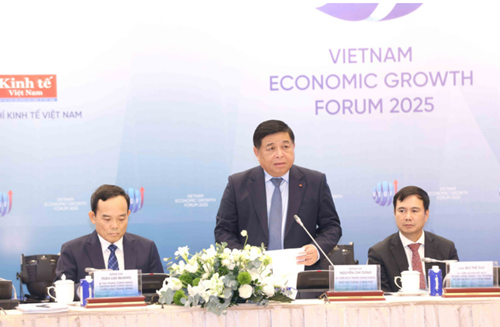The event was co-hosted by the Vietnam Economic Association, the Vietnam Association of Small and Medium Enterprises, and the Vietnam Economic Times in Hanoi on July 8.
In the context of a volatile global economy, Vietnam has set an ambitious growth target: GDP growth of 8% in 2025 and exceeding the double-digit mark (10% or more) in the 2026-2030 period. This is a landmark goal, requiring close and synchronous coordination between the Government, ministries, sectors, local authorities and especially the business community.
    |
 |
|
Deputy Prime Minister Nguyen Chi Dung speaks at the forum. |
As traditional growth drivers such as resource exploitation, public investment, cheap labor or processing exports gradually decline in efficiency and sustainability, the Vietnamese economy faces the inevitable need to find new breakthrough drivers.
In his keynote speech, Deputy Prime Minister Nguyen Chi Dung hailed Vietnam’s 7.52% economic growth in the first half of 2025, the highest in 15 years, as a testament to its resilience amid global challenges. Economists, both domestic and foreign, have noted Vietnam’s ability to maintain strong momentum, with ambitions to hit 8% growth in 2025 and 10% or more annually from 2026 to 2030.
To achieve these targets, Dung outlined a sweeping agenda centered on legal and institutional reforms to enhance transparency, stability, and alignment with international standards. He called for urgent revisions to laws governing land, minerals, and planning, and immediate action to revive 2,887 stalled projects, which tie up over 235 billion USD in capital and 347,000 ha of land, to unlock resources for development.
Public investment, Dung stressed, must act as a catalyst to raise private capital, with a focus on modernizing infrastructure, accelerating national projects, optimizing energy systems, and promoting renewable and new energy sources tailored to each stage of development.
He advocated leveraging new growth spaces through administrative reforms, including merging localities and adopting a two-tier local administration model, while tapping into sci-tech, innovation, digital transformation, artificial intelligence, semiconductors, and quantum technology.
The Deputy PM also championed new economic models, including free trade zones and financial centers paired with quality workforce training and global talent networks.
“These are key drivers to restructure the economy, establish a new growth model, and push for rapid and sustainable development based on science, technology, innovation and digital transformation, thereby delivering breakthroughs in the new era of growth,” said Dung.
In parallel with attracting major strategic investment projects, he also called for progress in international integration in the current context.
"This means domestic resources must be the foundation, while external resources should supplement and support development," he explained, adding that the integration process must ensure national independence, resilience and adaptability in the face of global disruptions.
The vision of a prosperous and powerful Vietnam would require joint efforts from the public as well as the private sector, in order to make the nation a safe, attractive destination and a regional and global hub for manufacturing, services and innovation, said the Deputy PM.
According to the organizers, the VEGF is expected to become an annual event with plenary and thematic sessions, aiming to bridge policymakers and key stakeholders, and foster stronger alignment between government policies and business practices.
Source: VNA